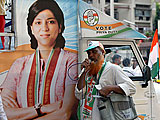Milestone for Indian Women
By Harsh V Pant for ISN
It was indeed an historic moment for India when the upper house of the Indian parliament, the Rajya Sabha, passed the Women’s Reservation Bill earlier this week. It was a long journey for a bill that was first introduced in the Indian parliament almost 14 years back.
And this journey aimed at securing a third of seats for women in the national and state legislatures is not over yet. The bill is yet to be to be passed by the lower house, the Lok Sabha, and more than half of the 15 state assemblies will have to endorse it.
In the end it all comes down to political will.
So far, it is the will of Sonia Gandhi, the leader of the ruling Congress Party, that has made the passage of this bill possible. The government led by Prime Minister Manmohan Singh had indeed expressed concern that the passage of this bill, which would require amending the constitution, would make it difficult for the ruling party to win approval from its allies for other important legislation. A small group of regional caste-based parties - including the Samajwadi Party and the Rashtriya Janata Dal - have threatened to withdraw their support from the ruling United Progressive Alliance.
Yet Gandhi insisted that the bill should go through, and the ruling party decided to move for the suspension of seven members of the Rajya Sabha on disciplinary grounds to ensure its passage in the house.
It is indeed interesting that the bill could pass because the left and right of the Indian political spectrum came together to support the government. The main opposition party, the Bharatiya Janata Party (BJP), and the Left parties voted with the government to pass the bill. The same process is likely to be repeated in the Lok Sabha.
The bill has long been seen as an important move toward the empowerment of women in a country where they seem to have lagged behind men in socio-economic and political spheres. According to the World Economic Forum, India ranks 114 in a list of 134 countries on global gender disparities.
Despite India producing a number of powerful women leaders such as Indira Gandhi, Sonia Gandhi and Mayawati, discrimination against women has continued unabated. A political consensus evolved in India since the early 1990s that greater political participation by women would lead to emancipation, and as such, various governments have attempted to pass a women’s reservation bill. None succeeded because of entrenched caste and religion-based identities that various political parties have tried to protect. The regional parties have argued that such a bill will merely benefit the upper caste while further marginalizing lower castes and Muslims. They have therefore demanded sub-quotas for women from lower castes.
The bill, clearly, is not without faults. Many critics argue that India’s political process, already under stress, will suffer as a result of this bill. Since the one-third of reserved seats will be decided by a lottery, around 180 male legislators will be de-linked from their constituencies every election cycle. This will not allow any relationship to evolve between the constituencies and their representatives.
Moreover, as parties will be forced to come up with new women candidates, the dependence of women politicians on their party bosses is only likely to increase. The wives and daughters of powerful politicians are likely to benefit most from such a scenario. This can only harm the process of women’s empowerment in India. After all, if political parties are seriously interested in greater participation by women in the parliament, then there is no reason why they can’t chose more female candidates.
The British had introduced separate electoral constituencies for women in the provincial elections of 1936-37 and 1946. When India became independent, the political leadership of the time rejected that system as being patronizing to women. India seems to have come full circle with the latest passage of the Women’s Reservation Bill.
By underlining that women need help to make their mark in politics, this bill will also appear paternalistic to many. The supporters suggest that women’s issues such as female infanticide, literacy and health will get higher priority in policy-making with greater female participation in the Indian parliament and state legislatures. It will be sometime before the effects of this latest Indian endeavor will make themselves clear to the Indians and to the world at large.

